1st Year
MONTH
3
1st Year – Month 3
A Special Note to Mom and Dad
About this time, many babies seem to settle down. Some don’t cry as much, and they are easier to comfort. This makes you feel more confident as a parent. And the more confident you feel, the more you will relax.
By spending less time crying and fussing, your baby has more time to learn. They can get their hand to their mouth and suck on their fingers, but your baby still doesn’t have full control over their arms and legs. They may get angry or frustrated when they can’t make their body do what they want it to.
If your baby reacts with fear or anger to new situations or doesn’t keep a regular schedule… then you could easily get angry, impatient, or confused.
Your baby really needs you to:
- Be patient
- Introduce new things, gently and slowly
- Offer several chances to get accustomed to new things
- Make life simpler, quieter, and less stimulating
When you do these things, your baby learns to deal with their feelings of fear or insecurity. If you have a partner, remember you’re in this together.
What’s It Like to Be 3 Months Old?
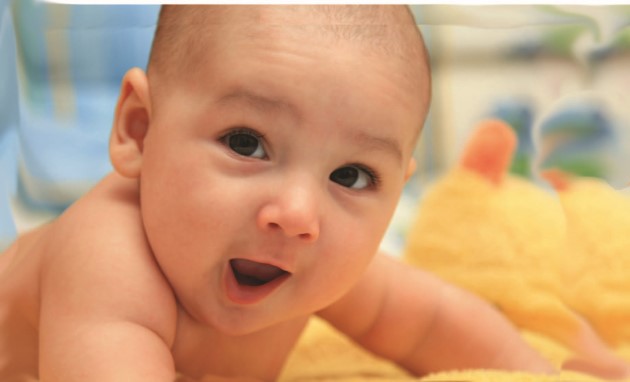
How I Grow and Talk
- I hold my head and back pretty straight when you support me.
- When you hold me, I push with my arms and legs.
- When I’m on my tummy, I can lift my head, lean on my elbows, arch my back, and rock.
- I like to put things in my mouth, so keeping things clean becomes even more important.
- I like batting at things hung from a mobile or toy bar. I may have better aim with my feet than with my hands.
- I may get a thrill when you lift me to a standing position, but my legs are not strong enough to support my body yet.
- Don’t put me in a walker. I cannot control a walker and may get hurt. Help me learn to move but not with a walker.
- When I see something I like, I squeal with delight.
- I coo simple sounds, such as “oy,” “aah,” and “ee.”
- I don’t cry as much as before. Have you noticed?
How I Respond
- I stare at the place where things drop, but I don’t watch where they go when they fall. Play peek-a-boo by hiding behind your hands or a blanket. I will love finding you when I see your face again.
- I follow sounds with my eyes.
- I like to listen. Talk to me in simple sentences — with real words.
- I react with my whole body to familiar faces.
- I am really into sucking. I’m not always hungry when I’m sucking. A lot of the time I’m just learning about things by putting them in my mouth
- I also use sucking to help me calm down when I’m upset. As I get older, I’ll grow out of my need to do so much sucking.
- I can see bright colors now.
How I Understand and Feel
- I am becoming really interested in people. I don’t like to be left alone. Let me sit where I can watch you!
- I am learning that my actions can bring results and that I can count on you to help me when I need it.
- I’m starting to have a memory. I can remember that I like some toys better than others.
- I usually love to be held, rocked, and cuddled. If I’m very active, you may have to catch me when I’m tired, before I want to slow down long enough to cuddle. If I’m extra sensitive to lights and noises, you may have to turn everything down and then very gently hold me.
- I may make a big discovery soon. I will learn to recognize your face from a photo.
Some children do things earlier or later than described here. Most differences are normal. Focus on what your child can do and get excited about each new skill. If you notice that your child is lagging behind in one or more areas for several months, use this list to talk with your doctor about your child’s development.
Brothers and Sisters Need to Feel Needed
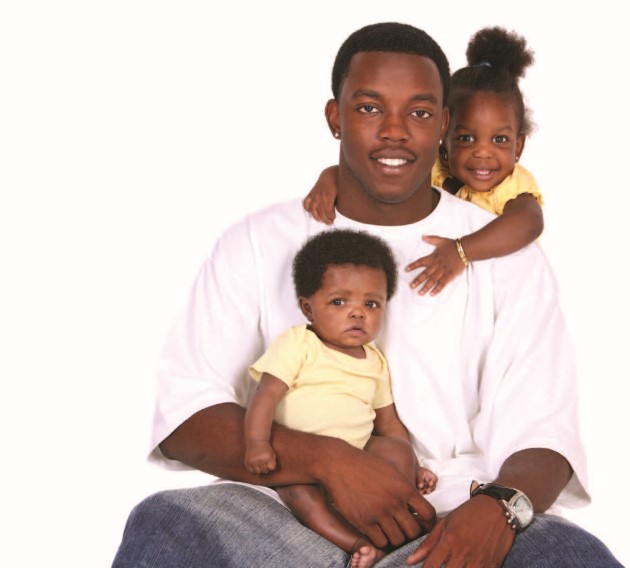
When you have a new baby, it’s normal for brothers and sisters to be upset at the way their family has changed, especially if they’re younger than 5 years old. A toilet-trained child may go back to diapers for awhile. Good eaters may lose their appetites. You may notice other changes, too.
Everyone is affected by having a new family member. Encourage the children to talk about both the good and bad parts of having a new baby.
Don’t go to another room and leave your baby alone with a child younger than 5. Young children can’t always control their actions. They may hurt the baby accidentally.
Spend time with your other children. Read books to the siblings about babies joining families. Involve the children in caring for the baby. Praise them when they do well. Teach them how to hold the baby and how close to sit. Help them recognize how the baby responds to them.
Help everyone learn how to handle your baby gently. It may be tempting to hear your baby giggle after tossing them in the air or bouncing them vigorously on your knee, but don’t. Babies can be injured this way. Rapid movement can damage blood vessels in a child’s brain, resulting in blindness, brain injury, or even death. Effects may not be noticed until later, when learning problems occur. Don’t take a chance! Never allow anyone to spank, shake, hit, throw, toss, or swing babies or young children.
Learning to Talk
What is that noise? Have you heard some strange shrieks coming from your baby? They are trying different sounds to see which ones get the attention they want. Keep listening. You may hear certain tones of voice and sentence patterns in your child’s babbling.
Talking and explaining helps your baby to understand. While you might feel silly talking to your baby, research shows that when you imitate and respond to your baby’s sounds, it helps them learn language.
Your baby may be getting ready to say their first word soon! They may make a sound such as “ba” that they use for many different things. These sounds indicate that talking isn’t far away. When your baby is between 9 and 12 months of age, don’t be surprised to find a real word or two mixed in with the babbling.
Use hand motions and actions to help your baby understand what you mean; point to different objects. Say the word as you point. Point to show which direction you want them to go.
Make Sure Your Baby Has Safe Playthings
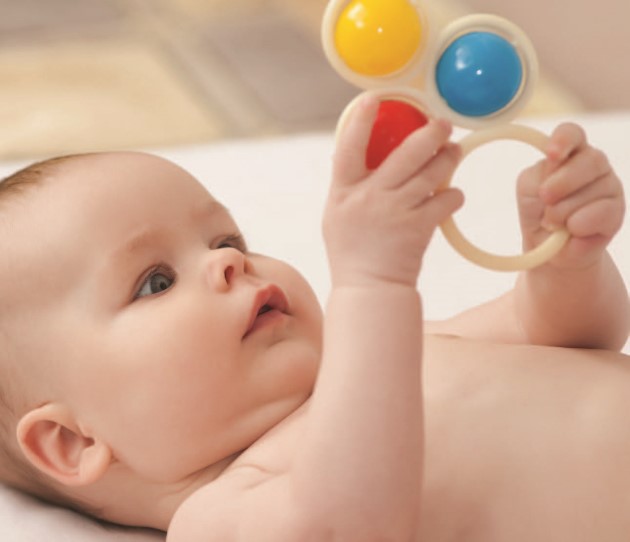
As your infant begins to put things into their mouth, be sure that they have safe things to play with.
Safe playthings:
- Are too large to fit into your baby’s mouth, ear, or nose
- Are light enough so they won’t cause harm if your baby drops them on themself
- Are nontoxic and made of non-breakable materials — never glass
- Do not have spikes or wires in them and are not sharp
- Do not have pinch points that might catch your baby’s fingers, skin, tongue, or lips.
Begin now to inspect your child’s toys to make sure they are safe. Even at this young age, children can have serious accidents with toys. Infants can partially swallow rattles while sucking on them or by falling on them when rolling over. The rattles can get jammed into the throat, causing the child to choke.
Squeeze toys and other teething toys have also caused babies to choke. Make sure that no part or end of a rattle can fit into your child’s mouth. A baby’s mouth is very flexible and can stretch to hold larger shapes.
To keep your child safe:
- Take all toys out of the crib when your baby sleeps.
- Do not hang pacifiers or toys around your baby’s neck and avoid hanging them from long strings above their bed. They can come loose and get tangled around their neck.
- Don’t give plastic bags to your baby as playthings.
- Remove stuffed toy animal eyes and buttons if they are loose or pinned on.
- Remove loose metal squeakers from squeak toys.
Buy toys that are washable. Children suck and chew on toys, so the toys should be easy to keep clean. Regularly check to see that the toys are not broken or about to break. Use the safety straps on an infant seat and keep it on the floor, away from steps and other dangers. Your baby is now strong enough to wiggle out of an infant seat and tip it over.
How to Play
Put your baby on the floor, in an infant seat or propped up enough to see you. Get your baby’s attention by making eye contact and calling their name.
Show your baby a toy. Say, “Look what I have. It’s a red rattle. Listen!” Then give the rattle to your baby. As they play, talk about what they are doing. Say, “You can make it rattle. How does it taste? Is it hard?”
Allow your baby time to play and explore what they can do with the toy.
Prevent Bottle Feeding from Causing Problems
One of the most important parts of feeding is the warmth and pleasure your baby feels while being held and fed. Don’t prop the bottle in your baby’s mouth and leave them alone. Doing so can lead to serious health problems, such as ear infections and tooth decay.
Don’t put your baby to bed with a bottle. There is a small opening or tube between your baby’s throat and their ear. If your baby is lying down and sucking on their bottle, a small amount of formula may travel from the throat to the ear and cause an ear infection. The formula that stays in their mouth when they’re asleep with a bottle can cause tooth decay.
Preparing a Sitter
Ask someone you trust to care for your baby. The first time you have a sitter, ask the person to come 30 minutes before you leave so you can show the sitter around your house and tell them about your baby’s routine.
Write Down the Following Information about Your Baby and Put It in a Folder for the Sitter:
- What usually happens at the time of day the sitter is present.
- Your baby’s favorite toys and activities.
- How your baby tells you that they are hungry, sleepy, or wet.
- What you do to calm your baby.
- How you feed, burp, diaper, and place your baby in the crib. (You always place your baby in the crib on their back with no pillows or toys.)
- Where to find things that the sitter will need for a diaper change, for warming a bottle, and for changing clothes.
Show the Sitter around the House and Where the Following Items Are Located:
- Telephones
- Flashlight
- Smoke detectors and fire escapes
- Emergency phone numbers
- Outside doors
- First aid kit
Provide the Sitter These Phone Numbers:
- Where you can be reached
- Your baby’s doctor
- Neighbors or nearby family members
- 911 or emergency response system (fire and police)
- Poison Control Center (800-222-1222)
- Your house address
- Address of nearest emergency room
- A signed consent form authorizing medical care within certain limits if you cannot be reached
Thumb or Pacifier?
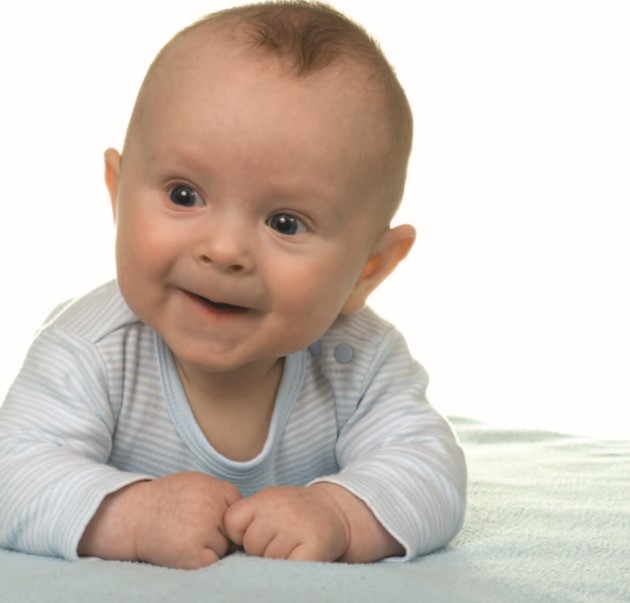
Many babies suck on a finger or pacifier. Doctors now think that using a pacifier may have benefits, but it’s best to wait until babies have learned how to breastfeed before giving them one.
The American Academy of Pediatrics says that babies who use pacifiers have extra protection from Sudden Infant Death Syndrome. It’s often easier for children to give up a pacifier than thumb sucking to avoid damaging their permanent teeth.
If your baby uses a pacifier, give it to them every time you put them down to sleep. Replace the pacifier before it falls apart and wash it often, especially if it falls on the floor. Do not put a pacifier on a string around your baby’s neck.
By the time your baby is a year old, the risk of SIDS is much less. Help your baby gradually give up the pacifier by holding a favorite toy or singing softly. That way their permanent teeth will grow in straight.
Feeding Your Baby
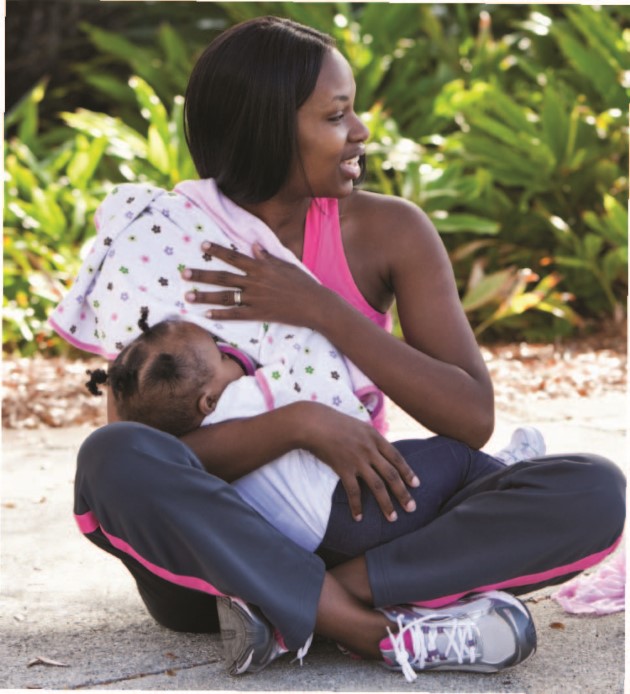
Breast milk or the formula recommended by your baby’s doctor is the only food your baby should have now.
Your baby’s feeding schedule should be on demand. They sense what their body needs and adjust how much they eat. Sometimes your baby will need more, sometimes less.
Your baby will have five to 10 feedings a day, drinking between 16 and 32 ounces of milk.
Be careful that your baby is not being fed too much. Interested friends and relatives may pressure you to “fatten them up.” Fat does not equal healthy. Researchers believe that putting on too much weight during these early months may cause your child to be overweight later. Babies need to be fed only the amount they want. If your baby isn’t hungry, don’t force them to eat.
Do not give your baby fruit juice. Fruit juices can lessen their appetite for what they really need — breast milk or baby formula.
Babies don’t need baby cereal until they are at least 4 to 6 months old. Feeding cereal to your baby does not help them sleep through the night. Your baby will sleep through the night when they are ready, usually when they weigh about 11 pounds, not because of what they eat.
Your baby may not be hungry every time they cry. When babies are fed too often, they eat less at each meal. Their stomachs empty more quickly, and empty stomachs soon make them hungry again.
Try to figure out why your baby is crying and soothe them in other ways. Giving them a bottle just to keep them quiet teaches them to connect food with being unhappy. This may lead to feeding problems later.
If you think it is too soon for your baby to eat again when they cry, try playing with them or helping them become interested in another activity. If they are truly hungry, they will let you know by trying to suck on their hand, your shoulder, or anything they can touch.
Keep extra containers of formula or breast milk cold. Bacteria grow rapidly in infant formula or breast milk that is not refrigerated. When you go out, take a bottle of formula or breast milk with you. Keep the bottle cold until your baby is ready to drink it. Pack the bottle in an insulated cooler with some ice.
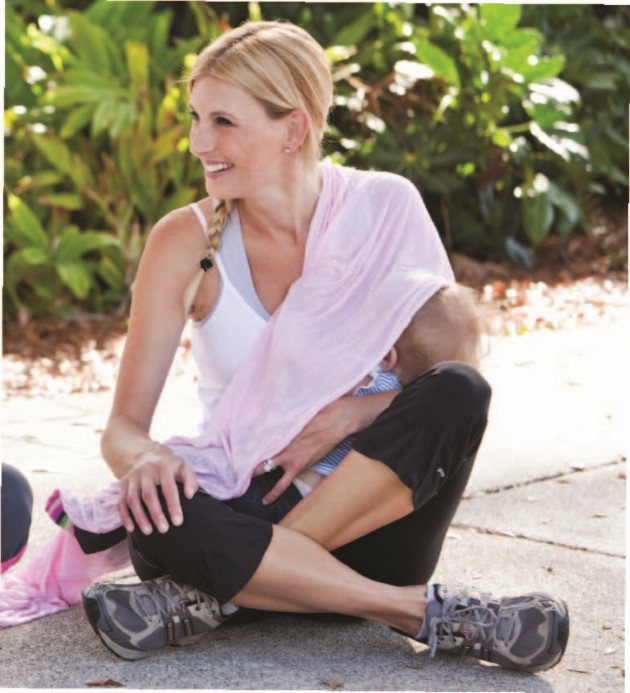
You Are Your Baby’s First and Best Teacher
Your child will learn more from you than anyone else during their lifetime.
Babies are born ready to learn. They are learning even before they are born. Research shows that when you talk to, hold, and care for your child, the brain is stimulated and the child learns to trust. They learn that you care. They learn that the world can be a good and safe place. The foundation you are building by forming a strong bond with your baby will help their brain and body grow in the best ways possible.
Parents tend to interact differently with boys and girls. Studies show that parents tend to imitate and encourage girls to be verbal, which may be one of the reasons girls usually talk earlier than boys. Parents tend to focus on motor skills with boys. It is important for parents to stimulate verbal development as well as physical development for both boys and girls. All babies need stimulation in all the different areas of development.
Take Excellent Care of Yourself
When you’re on an airplane getting ready to take off, you will be reminded that in the event of an emergency, you should secure your air mask before you secure the mask for children.
When it comes to parenting, that basic idea of taking care of yourself so you can take care of others is likewise important. Unless you take really good care of yourself, you won’t have the energy, stamina, or creative brain power to meet the challenges that parenting brings.
Stress is contagious. Your baby is becoming aware of your moods. They will sense when you are tense, as well as when you are calm and happy. Do everything you can to manage stress well. Have realistic expectations for yourself. Prioritize what you want to get done each day.
Exercise! With everything you have to do, exercise is one of the easiest things to leave out. But it’s one of the most important things you can do as a parent. It’s great to walk or swim, if you have someone to watch your baby. What exercises can you do without leaving home?
Here are two simple exercises that take just a few minutes and help to loosen up your body.
- Lie on the floor, on your back, and point your toes. Raise your right leg slightly and stretch your left arm toward your raised leg. Repeat with opposite arm and leg. Repeat six times.
- Lie on the floor, on your back, with arms stretched out to shoulder level. Bend your knees and lift your feet. Swing bent legs toward right, making sure your shoulders and arms are flat on the floor. Then swing legs to the left. Repeat six times.
Learning to Talk Helps Your Baby’s Brain Grow
Be at your baby’s eye level. Get down to where you meet your baby’s eyes or prop them up safely in an infant seat to make eye contact.
Look into your baby’s eyes and talk to them. Repeat the sounds they make. The two of you can play verbal ping pong. Your baby makes a sound. Then you make the same sound. Keep going back and forth.
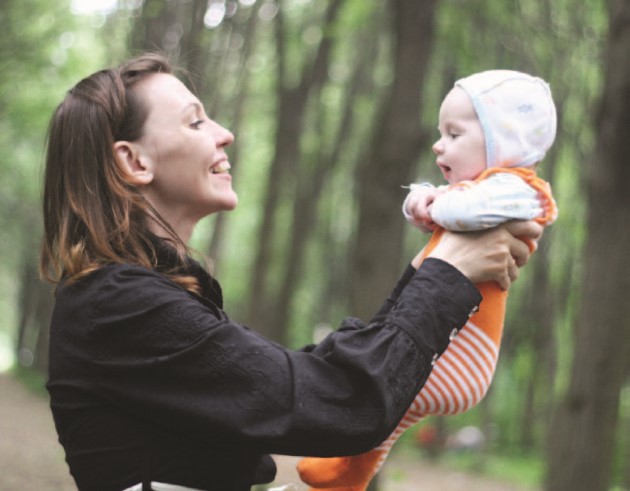
Each child will “talk” in different ways. Your job is to learn your baby’s special ways of trying to talk to you. When you copy your baby like you’re talking with them, you’re helping them learn how to use language.
Good language skills help wire your baby’s brain in the most powerful way. Language skills are the key to social and emotional well-being as well as school success.
Reminders
Subscribe: If you are not already a subscriber, you can receive the newsletters direct to your email on your child’s birthday. Register at JITP.info (English) or (Spanish).
Every baby is unique: When reading this newsletter, remember: Every baby is different. Babies may do things earlier or later than described here.
Updates: We are constantly reviewing and updating JITP.info. See our current plans on the About Us page. Do you have questions or corrections? Email us at contact@jitp.info.
Credits: This newsletter was reviewed and updated in 2019 by Dan Weigel (University of Nevada-Reno) and approved by the JITP Board.